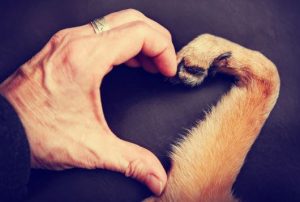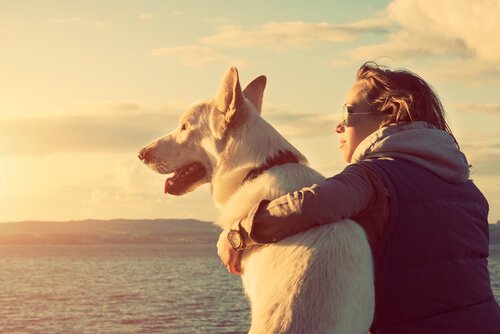How to Cope With the Death of a Pet

Coping with the death of a pet is an experience that all of us who love animals experience at some time or another. But do we all experience grief and loss the same way? The answer is no. Although grief is a universal phenomenon, the ways of handling grief vary greatly, and often depend on cultural and religious factors, among other things (Marqués, 2003).
In the same way that mourning is expressed for the loss of people, it’s also expressed when we lose our pets. But what makes people experience mourning for the death of a pet? Quite simply because the bond that was formed between the humans and the pet was such that the pet was a part of the family (Field, Gavish, Orsini & Packman, 2009).
And when I realized that you wouldn’t come back, it was then that I knew that breathing hurts.
People who don’t accept suffering will suffer throughout their whole lives
Thelma Duffey (2005), Ph.D. from the University of Texas at San Antonio confirms that the death of a pet is experienced as a genuinely painful experience. To this suffering, we must add the cultural taboos that are associated with mourning for the loss of an animal. This pain isn’t usually understood by a large part of the population, which makes the grieving processes all the more difficult.

Although many people create a special bond with their pets, there are others who don’t develop that attachment and therefore aren’t able to appreciate the relationships between humans and animals. Those who don’t understand this relationship often underestimate the loss, and even make comments such as “It was only a dog”, “Just get another one”, and “Why are you so sad over an animal?”.
The loss of a pet can be one of the most difficult moments in a person’s life, even though at a social level it’s not recognized as having the same emotional impact that we experience with a human loss. According to a study by the Department of Animal Sciences of the University of Hawaii (United States), 30% of owners feel pain for six months or more, while for 12% it’s a very traumatic event in their lives.
Say goodbye when you want to doesn’t hurt, what does hurt is what you’ll miss after that goodbye.
How can we cope with mourning for the loss of our pet?
The grieving process consists of four stages, the same ones we experience when someone close to us dies:
- Denial. At this stage, we haven’t yet been able to come to terms with the loss, and we use the denial of what happened as a defense mechanism to postpone the impact. Some practical advice here would be to get rid of or store our pet’s toys.
- Expression of emotions: sadness, depression or anger. We can feel many things as a consequence of our loss. To alleviate these emotions, we shouldn’t try to hold those tears back. We don’t have to pretend to be OK when we aren’t; we have to let our emotions out and experience them. What we need to do is let ourselves feel the loss and let the tears flow, because it’s all part of the healing process.
- Reconstruction. In this stage, we come to terms with the emptiness our pet has left behind, and we realize all the daily routines that we had created with our pet. Routines that we maybe didn’t realize had become such an important part of our lives. Routines such as taking our dog for a walk, playing in the park with him, relaxing on the sofa. What we need to do now is create new routines.
- Relating to the memory of our pet in a different way. This is all about looking to the future and moving forward along the road to recovery. By doing this, we’ll remember the tremendous love we felt towards them.
To overcome is not to forget, to overcome is to realize that he will no longer be here for you, but that he made you so happy when he was.

Don’t cry because it ended, smile because it happened
We all live through similar situations in a different way. We won’t all take the same time to recover from the grieving process for the loss of our pet.
Some of us choose to get another pet, others choose to live without one. We shouldn’t feel bad if we decide to have another pet. We need to realize that it isn’t a matter of “replacing” it, but of starting a new road full of new routines and wonderful experiences with our new pet.
Bibliography
Duffey, T. (2005). Saying goodbye: Pet loss and its implications. Journal of creativity in Mental
Health 1 (3/4), 287-295. doi: 10.1300 / J456v01n03_18
Field, N., Gavish, R., Orsini, L. & Packman, W. (2009). Role Attachment in Response to Pet Loss. Death Studies, 33, 334-355. doi: 10.1080 / 07481180802705783
Marquis, N.M. (2003). From the experience of mourning: Reflections on the Meanings of Death and Lifetime. Pontificia Universidad Católica, Ponce, P.R.
This text is provided for informational purposes only and does not replace consultation with a professional. If in doubt, consult your specialist.








